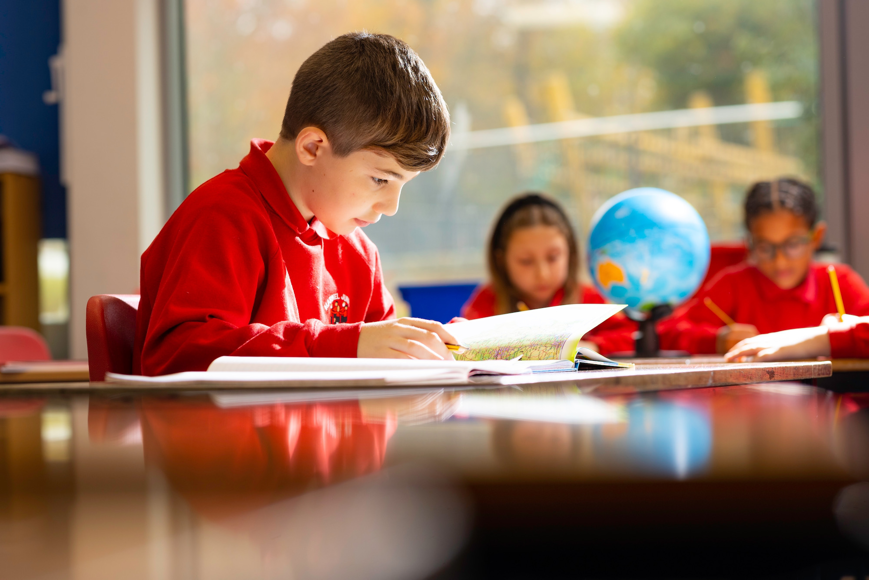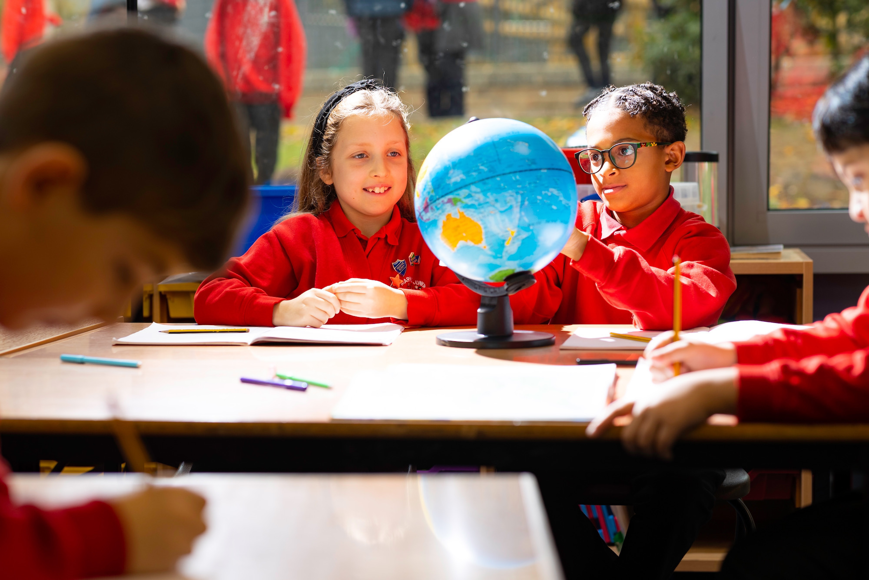Geography
Whole school progression document
Intent
At Marnel Junior School our Geography curriculum is designed to develop children’s curiosity and fascination about the world and its people that will remain with them for the rest of their lives.
Children will investigate and learn about a range of places, both in Britain and abroad, to help develop their knowledge and understanding of the Earth’s physical and human processes and increasingly complex and rapidly changing world.
We are committed to providing children with opportunities to investigate and make enquiries about their local area of Hampshire so that they can develop a real sense of who they are, their heritage and what makes our local area unique and special. Sustainability links across the year are central to our curriculum as we want to ensure that our pupils understand the impact humans have on the environment and encourage them to thinks about preserving our planet in the future.
We aim to also develop the children’s ability to apply geographical skills and knowledge progressively throughout their time here with us. Our Geography curriculum meets the requirements of the National Curriculum but also meets the needs of our children by allowing them to enquire the human and physical features of the world. Our curriculum allows pupils to become passionate young geographers, enabling them to confidently communicate their findings and geographical understanding to a range of audiences.
Through high quality teaching, we develop the following essential characteristics of geographers:
- An excellent knowledge of where places are and what they are like, both in Britain and the wider world.
- A comprehensive understanding of the ways in which human and physical features change and our roles and responsibilities within that.
- An extensive base of geographical knowledge and vocabulary.
- Fluency in complex, geographical enquiry, and the ability to apply questioning skills.
- The ability to reach clear conclusions and explain their findings.
- Excellent fieldwork skills as well as other geographical aptitudes and techniques.
- The ability to express well-balanced opinions, rooted in very good knowledge and understanding about current issues in society and the environment.
- A genuine interest in the subject and a real sense of curiosity about the world and the people who live here.
Implementation:
Teachers are supported to plan an inspiring curriculum which asks ‘big questions’ to motivate our pupils into becoming enthusiastic geographers. As part of the planning process teachers will plan for:
- A knowledge organiser which outlines knowledge (including vocabulary) all children must master and apply in lessons.
- A cycle of lessons for each subject, which carefully plans for progression and depth concentrating on the geographical skills suited to the age group.
- Cross Curricular links with other subjects.
- High expectations for all pupils with progressive layers providing scaffolds and stretch.
- When Layers are used, they allow children to deepen their skills and knowledge within a lesson.
- Trips and visiting experts who will enhance the learning experience.
- AI will be used to enhance virtual reality experiences, allowing students to "visit" different places around the world, exploring landscapes and cultures without leaving the classroom.
- A well-designed curriculum and progression of skills document which allows skills and knowledge to be built on throughout pupils’ time with us.
- Sustainability links and key questions throughout units
- Lessons which skilfully follow Rosenshein’s principal of instruction.
- Lessons which will use retrieval practice to consolidate prior learning and deepen long term memory.
- The use of warm assessments at the end of the learning journey to assess the children’s understanding.

Implementation
Teachers are supported to plan an inspiring curriculum which asks ‘big questions’ to motivate our pupils into becoming enthusiastic geographers. As part of the planning process teachers will plan for:
- A knowledge organiser which outlines knowledge (including vocabulary) all children must master and apply in lessons.
- A cycle of lessons for each subject, which carefully plans for progression and depth concentrating on the geographical skills suited to the age group.
- Cross Curricular links with other subjects.
- High expectations for all pupils with progressive layers providing scaffolds and stretch.
- When Layers are used, they allow children to deepen their skills and knowledge within a lesson.
- Trips and visiting experts who will enhance the learning experience.
- AI will be used to enhance virtual reality experiences, allowing students to "visit" different places around the world, exploring landscapes and cultures without leaving the classroom.
- A well-designed curriculum and progression of skills document which allows skills and knowledge to be built on throughout pupils’ time with us.
- Lessons which skilfully follow Rosenshein’s principal of instruction.
- Lessons which will use retrieval practice to consolidate prior learning and deepen long term memory.
- The use of warm assessments at the end of the learning journey to assess the children’s understanding.
Impact
Our Geography Curriculum is high quality, well thought out and is planned to demonstrate progression.
We ensure that -
- Children have opportunities to explore the outdoor learning environments, both within the school grounds and local community.
- Our children will be confident geographers and be able to clearly discuss their learning from past and current topics.
- There will be a clear progression of skills across Key Stage 2 that builds on prior knowledge, that can be demonstrated in books and through verbal feedback from pupils.
- Pupils will leave Marnel Junior school with a strong knowledge of their local area and a confidence of the location of other countries and cities around the world.
- All pupils will be able to discuss and recall a variety of events and where they happened in the world.
- Children will be able to explain aspects of human and physical geography and confidently use maps and atlases (physical and digital).
- Pupils leave us with a sense of responsibility in sustainability
- Out-of-class opportunities ensure geography is ongoing and embedded as part of our school ethos e.g., Eco warriors which allows children to take responsibility for looking after their environments.
- Continued training and support for teachers ensuring they are the experts in the subjects that they teach.
If children are keeping up with the curriculum, they are deemed to be making good or better progress. In addition, we measure the impact of our curriculum through the following methods:
- A reflection on standards achieved against the planned outcomes.
- Use of the knowledge organiser as a form of assessment tool, to activate prior learning.




